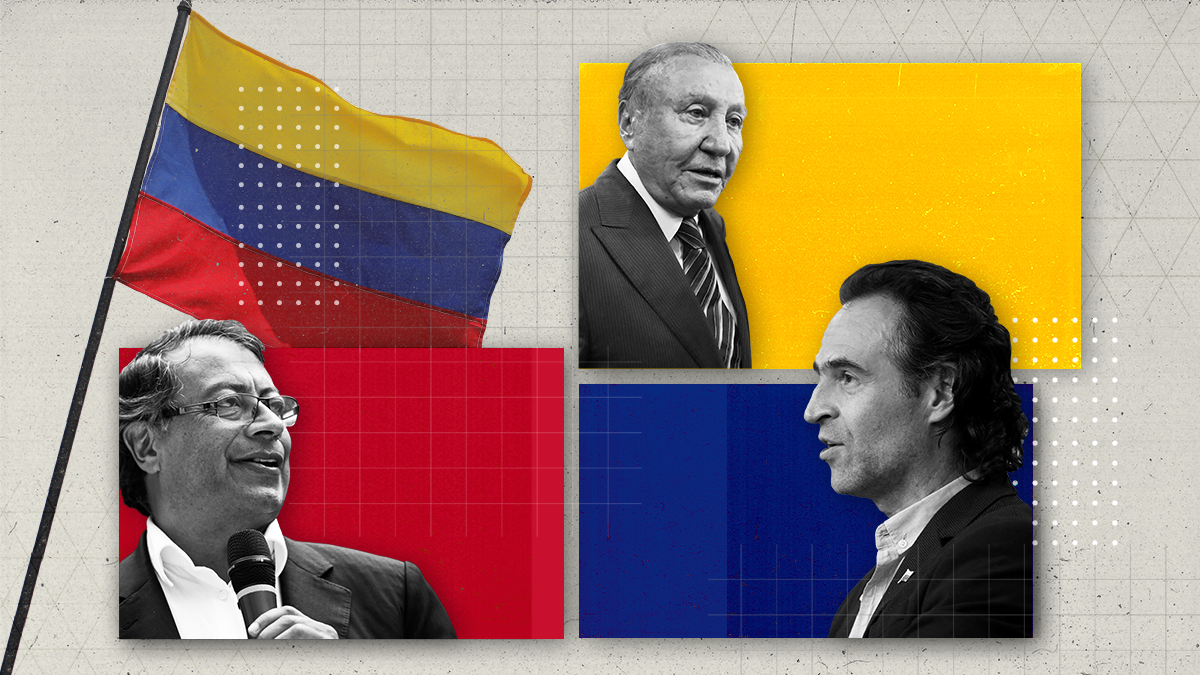Against a backdrop of grinding inequality, rising violence, and widespread frustration with the political class, Colombians head to the polls on Sunday in the first round of what could be a watershed election for one of Latin America’s largest economies.
The past several years have been tumultuous for Colombians. The pandemic pushed 3.5 million of them into poverty, raising the overall rate to more than 40% of the population. Unemployment is running above 10 percent and inflation is at a 21-year high. There were mass urban protests over inequality in 2019 and a botched tax reform in 2021. Both led to deadly clashes with the police.
Meanwhile, Colombia has gotten more dangerous. After nearly two decades of steady declines, the homicide rate jumped 13% last year, and lackluster implementation of the historic 2016 peace accords with FARC guerillas has left vast areas of the country under the control of other armed groups or traffickers. Earlier this month, a major cartel paralyzed parts of a dozen different Colombian regions with an “armed strike” to protest the extradition of their leader to the United States.
Not surprisingly, most Colombians are fed up. Outgoing president Iván Duque has an approval rating of barely 20%. Polls show that the economy, corruption, and inequality top the list of voter concerns.
But Elizabeth Dickinson, a Colombia analyst at Crisis Group, says most Colombians’ frustrations now go beyond specific issues to something broader – “the lack of social mobility, the inequality, and an exclusionary system that privileges a small and self-contained elite.”
The three leading candidates offer very different visions for how to fix all of this.
So who are they?
The (ex)revolutionary: Gustavo Petro. As a young man, the leading opposition senator and former Bogotá mayor was part of a left-wing rebel group. His politics have mellowed since then, but the 62-year-old Petro still seeks major changes to tackle systemic inequality. He says he’d boost taxes on the rich, expand healthcare and education rights, shutter the oil and mining industries, give state jobs to the unemployed, and reframe the war on drugs as a socioeconomic issue rather than a security one. If he wins, he’d be the first overtly leftist president in Colombia’s history. And although Petro would lack power in Congress, his critics warn that he could bankrupt the country or turn it into a new Venezuela. But for those who want a left-leaning Colombia that empowers the marginalized, Petro is the clear choice.
The continuity candidate: Federico “Fico” Gutierrez. The 47-year-old former mayor of Medellín is the flagbearer of Colombia’s mainstream conservative camp. With the support of powerful former president Álvaro Uribe, Gutierrez has focused on law and order themes, promising a tough-on-crime approach, coupled with austerity measures to balance Colombia’s deeply in-the-red budget. For those who don’t want to rock the boat too much, “Fico” is the man of the hour.
The wildcard: Rodolfo Hernández. The 77-year-old self-made construction tycoon and former small-town mayor has an unvarnished, impulsive, and perma-tanned style that evokes shades of Donald Trump or Silvio Berlusconi. Hernández, who has surged lately in the polls thanks to his social media savvy and his anti-corruption message, is hard to pin down ideologically. He wants to slash taxes, legalize cocaine, boost import substitution, and fire a third of the state bureaucracy. But that’s all part of his appeal: he comes across as a fresh alternative to an insular and corrupt political class. For those who want big changes but are scared of Petro’s leftism, Hernandez is the pick.
Polls show Petro with a sizable lead, enjoying the support of about 40% of voters. Gutierrez and Hernandez are now in a virtual dead heat for second place, with around 20% support each.
Most experts think that Petro would likely win a second round against either of them, but that Hernández’s populist message would compete more favorably now than Gutierrez’s warmed-over continuity.
“There’s a climate of generalized rejection of the political class,” says Yann Bassett, a political scientist at the Universidad del Rosario in Bogotá. “So there’s a competition to embody change.”
What happens next? Unless any candidate gets more than 50 percent of the vote, which is very unlikely, the top two finishers on Sunday will head to a runoff in June.
The upshot: A clear majority of Colombians want big changes. On Sunday, we’ll learn more about what, precisely, that means.This comes to you from the Signal newsletter team of GZERO Media. Subscribe for your free daily Signal today.
